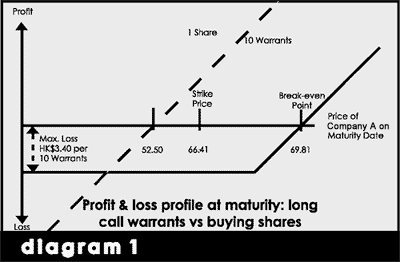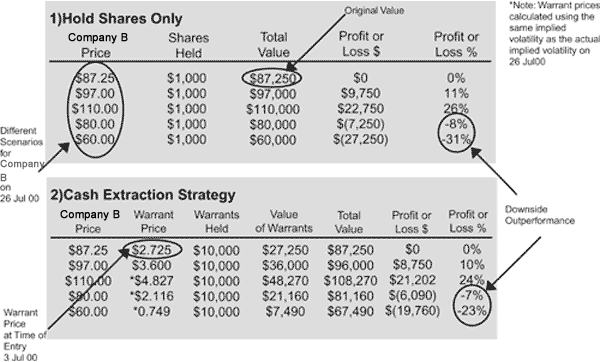|
|
 |
| Copyright 2002.
Information below are provided by SG Securities (HK)
Limited. All Rights Reserved. |  |
|
|
| Leverage
"Unlimited Gains with Limited Losses"
|
|
First and main point to remember is that
warrantholders do not have to keep the warrant
until maturity to make a profit. They can buy a
warrant at launch date or after through the Stock
Exchange and sell the warrant a couple of days,
weeks or months later or hold on to it until
maturity. The profit and loss profile will be
different according to how long the warrantholder
keeps the warrant.
The fundamental advantage of buying a call
warrant, as opposed to a direct investment in the
underlying asset, resides in the leverage effect
that warrants offer. When buying warrants, the
investor is required to outlay only a small
proportion of the underlying asset price.
The leverage effect enables investors to gain
exposure to the underlying through a small amount
of money.
| Example: |
| all warrants on
Company A |
| (stock code:
9901.HK) |
| Terms and conditions
as of launch date (15 Feb 00): |
Maturity
date
| 7 Sep 2000 |
Type
| European-style call warrants |
Underlying
| Company A |
| Strike price | HKD 66.41 |
| Converting ratio | 10 warrants for 1
share |
|
On 30 May 2000, an investor
could buy a minimum board lot (10,000) of SG
Company A call warrants 9901.HK and invest as low
as HKD 3,400.00 (10,000 x HKD 0.34) whereas direct
investment in a board lot of shares required an
investment of HKD 52,500 (1,000 x HKD
52.50).

|
|
| Buy the Shares (dotted
line) |
| On 30 May 2000, an
investor buys 1,000 shares of Company A at HKD
52.50 with a total cash outlay of HKD 52,500.00.
The investor then sells the shares on 20 Jun 2000
at HKD 65.00 for a gain of 23.80%. |
|
| Buy the Call Warrant
and sell 3 weeks later |
| On 30 May 2000, instead of
buying the shares the investor buys 10,000 call
warrants 9901.HK at HKD 0.34 with total cash
outlay of HKD 3,400.On 20 Jun 00 call warrant
9901.HK rose to HKD 0.86 making a gain of
153%. |
|
| Buy the Call Warrant
and hold until maturity (plain
line) |
| Alternatively, if the
warrantholder held 9901.HK until maturity, the
potential profit and loss profile would be like
diagram 1. As one can see, using the call warrant
strategy, the maximum loss at the time of maturity
would be the full value of the call warrant while
the maximum loss for the stockholder would be the
full value of the stock. |
|
| Cash
Extraction |
| Taking advantage of the
leverage effect, investors already holding shares
but needing cash can sell their shares and buy
warrants to keep an exposure to the underlying.
Assuming no commission, transaction levy and
stamp duty (to simplify calculation), the investor
would receive the sale proceeds of HKD 87,250 (HKD
87.25 x 1,000) and pay HKD 27,250 (HKD 2.725 x
10,000) for purchasing the warrants. In the
process, there is a cash extraction of HKD 60,000
(HKD 87,250 - HKD 27,250) while maintaining the
exposure to Company B.
|
|
| Buy the Call Warrant as
Cash Extraction: |
| Example: |
| Call warrants on
Company B |
| (stock code:
9902.HK) |
| Terms and conditions
as of launch date (31 May 1999): |
Maturity
date
| 11 Dec 2000 |
Type
| European-style call warrants |
Underlying
| Company B |
| Strike price | HKD 64.125 |
| Converting ratio | 10 warrants for 1
share |
|
On 26 Jul 2000 Company B closed at
HKD 97.00 which is up 11.17% from where the
investor sold his shares on 3 Jul 2000. However
the investor did not miss out on these extra gains
as the call warrant on Company B rose to HKD 3.60
which translates into a gain of 32.11% on the
warrant price.
The 2 tables below show a comparison of the 2
strategies at different future prices of Company B
on 26 Jul 2000. The total Value of the Cash
Extraction Strategy is the value of the warrant
and HKD 60,000 cash extracted from selling Company
B shares on 3 Jul 2000. Note the Cash Extraction
Strategy only underperformed slightly if Company B
rose but outperformed by a wide margin on the
downside if Company B should fall.
 |
|
|
|
|
 |
|
| |
| |
| Information and services in this
section are offered only to Hong Kong residents. For the full
terms and conditions, please click
here
.
|
| |
| The above hyperlinks may take you to websites published or operated by third parties not affiliated with Hang Seng Bank Limited ("the Bank"). The third party websites accessed through these hyperlinks may not provide you with any regulatory protections. The Bank is not liable for your use of the hyperlinked websites. |
| |
Information (the "information") which is "Powered By" BNP Paribas Hong Kong Branch, Credit Suisse (Hong Kong) Limited, ET Net Limited, Macquarie Capital Securities Limited, SG Securities (HK) Limited, The Hongkong and Shanghai Banking Corporation Limited and UBS AG London Branch re-transmitted by the Bank in the ordinary course of business to you for general information and reference purpose only. The Bank, its officers, employees and agents did not devise, select, add to, modify or otherwise exercise control over the Information, do not take responsibility for the Information nor do they endorse the accuracy of it.
The prices of securities fluctuate, sometimes dramatically. The price of a security may move up or down,
and may become valueless. It is as likely that losses will be incurred rather than profit made as a result of buying
and selling securities.
|
| |

Disclaimer |
| |
|
|
|
| |
|
|  |
 |  |  |
|